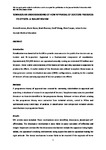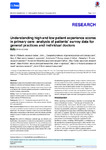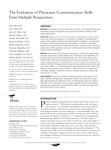RULING OUT THE 'BAD THINGS:' HOW PHYSICIANS MAKE MEANING OF PERSISTENT UNEXPLAINED ILLNESS IN CHILDREN
| dc.contributor.author | VARGA, STEFANIE | |
| dc.contributor.other | Faculty of Health | en_US |
| dc.date.accessioned | 2013-11-18T13:11:59Z | |
| dc.date.available | 2013-11-18T13:11:59Z | |
| dc.date.issued | 2008 | |
| dc.identifier | NOT AVAILABLE | en_US |
| dc.identifier.uri | http://hdl.handle.net/10026.1/2736 | |
| dc.description.abstract |
This was a study of physicians' narratives regarding their medical experiences with children with persistent medically unexplained physical illness. The goal was to better understand those attitudes and beliefs that are involved in the construction of meaning regarding the child's symptoms of illness or pain. The study also sought to learn more about physicians' early life experiences with health and illness and their potential to shape diagnostic thinking and treatment. Ten physician participants were interviewed using an open-ended, semistructured interview methodology. Interviews were analyzed using an alternative narrative approach described by Mishler (1986, 1991) to identify key themes within and across interviews for comparative analysis. The subjective experience and dynamic discourse between interviewer and participant were also analyzed (Mishler, 1991; Paget, 1983). Four key themes emerged: (1) the experience of certainty and uncertainty; (2) physician search for restitution; (3) the path to truth and the construction of the physician's illness narrative; and (4) the parallel anxiety between physician and parent. Findings suggested a "stages of training" model or developmental career theme associated with the ways in which physicians make meaning of persistent medically unexplained illness or pain in the child. Implications for diagnosis and treatment include the possibility that the nature of the relationship between physicians and parents-- particularly the ability to negotiate trust, intimacy, and power--may lead to a hidden and collaborative meaning making of symptoms that occurs in exclusion, of the child, Certain early life experiences of the physician may also be brought to bear in the medical encounter with parent and child. Physicians would benefit from training in neutrality and negotiation of therapeutic goals with parents of sick children, as well as training to enhance self-awareness and understanding of the ways in which alliances and conflicts with patients and parents may occur as a result of family of origin issues. | en_US |
| dc.language.iso | en | en_US |
| dc.publisher | University of Plymouth | en_US |
| dc.subject | child somatization | en_US |
| dc.subject | physician narrative | en_US |
| dc.subject | physician attitude | en_US |
| dc.subject | physician belief | en_US |
| dc.subject | physician stages of training | en_US |
| dc.subject | physician uncertainty | en_US |
| dc.title | RULING OUT THE 'BAD THINGS:' HOW PHYSICIANS MAKE MEANING OF PERSISTENT UNEXPLAINED ILLNESS IN CHILDREN | en_US |
| dc.type | Thesis | |
| plymouth.version | Full version | en_US |
| dc.identifier.doi | http://dx.doi.org/10.24382/3556 |
Files in this item
This item appears in the following Collection(s)
-
01 Research Theses Main Collection
Research Theses Main





